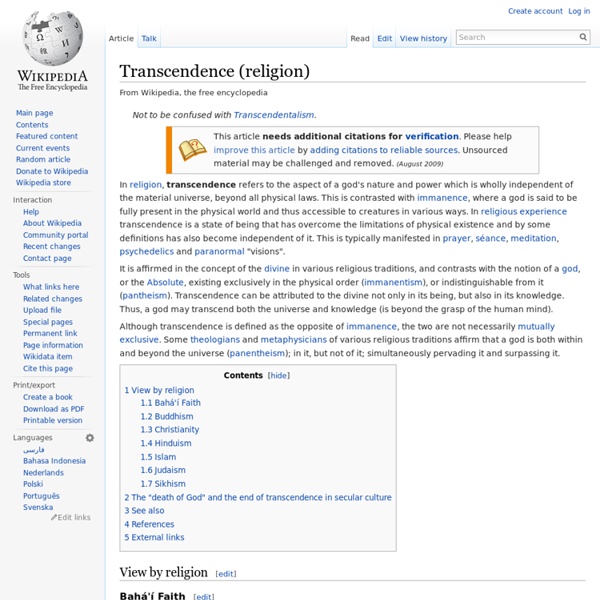Phenomenology (philosophy)
Phenomenology (from Greek: phainómenon "that which appears" and lógos "study") is the philosophical study of the structures of experience and consciousness. As a philosophical movement it was founded in the early years of the 20th century by Edmund Husserl and was later expanded upon by a circle of his followers at the universities of Göttingen and Munich in Germany. It then spread to France, the United States, and elsewhere, often in contexts far removed from Husserl's early work.[1] Phenomenology, in Husserl's conception, is primarily concerned with the systematic reflection on and study of the structures of consciousness and the phenomena that appear in acts of consciousness. Hicks writes, "In effect, the Structuralists were seeking subjective noumenal categories, and the Phenomenologists were content with describing the phenomena without asking what connection to an external reality those experiences might have
Phenomenology (philosophy)
Phenomenology (from Greek: phainómenon "that which appears" and lógos "study") is the philosophical study of the structures of experience and consciousness. As a philosophical movement it was founded in the early years of the 20th century by Edmund Husserl and was later expanded upon by a circle of his followers at the universities of Göttingen and Munich in Germany. It then spread to France, the United States, and elsewhere, often in contexts far removed from Husserl's early work.[1] Phenomenology, in Husserl's conception, is primarily concerned with the systematic reflection on and study of the structures of consciousness and the phenomena that appear in acts of consciousness. Hicks writes, "In effect, the Structuralists were seeking subjective noumenal categories, and the Phenomenologists were content with describing the phenomena without asking what connection to an external reality those experiences might have
Ontology
Philosophical study of being Ontologists disagree about which entities exist on the most basic level. Platonic realism asserts that universals have objective existence. Conceptualism says that universals only exist in the mind while nominalism denies their existence. There are similar disputes about mathematical objects, unobservable objects assumed by scientific theories, and moral facts. Materialism says that, fundamentally, there is only matter while dualism asserts that mind and matter are independent principles. The origins of ontology lie in the ancient period with speculations about the nature of being and the source of the universe, including ancient Indian, Chinese, and Greek philosophy. Ontology is the study of being. The word ontology has its roots in the ancient Greek terms ὄντως (ontos, meaning being) and λογία (logia, meaning study of), literally, the study of being. Being, or existence, is the main topic of ontology. Particulars and universals [edit] By number of categories
“Can you recommend a good book on writing?”
I am often asked to recommend a ‘good book on writing’. A simple enough question, but one that is surprisingly hard to answer. In my attempts to do so, I feel a bit like a sommelier, responding to the question with a few of my own: Are you having the fish or the lamb? Do you tend to like full-bodied reds? That is, it’s hard to recommend a book without knowing what sort of writing project you are doing and what sort of support you are likely to perceive as valuable. This list includes some of the books that I find helpful, allowing you to see what might be beneficial to you. Needless to say, some of you will gravitate more naturally to online resources for writing. Note: I’ve included U of T library links for those of you who are local. Jacques Barzun, Simple and Direct: A Rhetoric for Writers, Fourth Edition (New York: Quill, 2001). Howard S. Wayne C. Claire Kehrwald Cook, Line by Line: How to Edit Your Own Writing (Boston: Houghton Mifflin, 1985). Patricia T. John M. Joseph M.
Art of Noosphere Archetypes
Art of Noosphere Archetypes The present section "Art of Noosphere Archetypes" is devoted to the demonstration of works and works of art which are connected with deep archetypes of our individual consciousness, collective unconsciousness, universal reason, superconsciousness. The authors of the submitted works have devoted long years to spiritual search and laborious research of ancient traditions, their judgement in connection with the life of the modern person and society. Having familiarized with the contents of the unit "Art of Noosphere Archetypes", you will receive not only aesthetic pleasure from the beautiful, but also will be able to work the problems connected with the individual unconsciousness of your soul, karmic problems of the past embodiments. Magic of Fractal Archetypes (Alexandr Kurilov) Archetypes of singing words (Dmitry Ryazanov) (in Russian)



